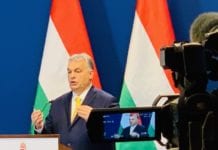By Eric Leijenaar, BosNewsLife Senior Special Correspondent reporting from the Netherlands and BosNewsLife’s Stefan J. Bos at BosNewsLife News Center in Budapest

TASHKENT/BUDAPEST/AMSTERDAM (BosNewsLife)– An international protest was underway Tuesday, May 12, to obtain the release of a detained, frail, evangelical pastor in Uzbekistan, who came to symbolize what rights investigators described as widespread persecution of Christians and other minorities in Central Asia.
Dmitry Shestakov, pastor of the registered ‘Full Gospel Congregation’ in the town of Andijan, has been suffering of serious health problems since he was moved to a notorious labor camp in 2007, confirmed advocacy group Open Doors, which closely monitored the case.
The Netherlands-based group said it has urged Christians to write protest letters to the Uzbek embassy in Brussels, where the European Union and NATO have their headquarters.
“His health has deteriorated because of the difficult circumstances in the labor camp,” said Open Doors spokesman Klaas Muurling told BosNewsLife. “There is a lack of food and temperatures are extreme, both in summer and winter.”
He said Open Doors regards him as a “prisoner of conscience who has been illegally detained.”
SUNDAY SERVICE RAIDED
Pastor Shestakov was arrested by Uzbekistan’s feared National Security Service (NSS) secret police during his church’s Sunday service January 21, 2007, on charges of “illegal organisation of social or religious organisations”, “distributing materials containing ideas of religious extremism” and “inciting ethnic, racial or religious hatred,” although the last charge was later dropped, according to rights investigators.
Soon after, he was sentenced to four years in an “open labor camp”, but in June, 2007, Dmitry was transferred to a harsher, closed, labour camp, at least over 560 kilometres (350 miles) from his home and family in Andijan.
The transfer to Navoi camp came after the court said the pastor had “abandoned” his plans to appeal the sentence because of his poor health. Fellow Christians say he has been pressured by authorities. Shestakov’s friends asked for amnesty late 2007, but their request was refused amid further trials against members of his embattled congregation in Andijan and other Protestant churches throughout Uzbekistan, local Christians and rights groups said.
In addition, state-run media have tried to pressure his church, by accusing the pastor of misusing alcohol and drugs, Open Doors added.
Since his detention, he was long not allowed to read a Bible, and very few visitors were able to see him, Christians said.
NOT GIVING UP
Yet his wife, Marina, stressed in published remarks that her husband has not given up hope. “When I met with Dmitry in prison I thought he was the one who was going to need encouragement, but he told me: ‘I am a free person, even though I am here in prison.
Where the Spirit of the Lord is, there is freedom’,” she said.
Rights group Christian Solidarity Worldwide (CSW) said it was concerned however about reports of mistreatment in the camp. “Based on accounts by former prisoners at the camp, inmates are routinely beaten and forced to renounce their ‘crimes’. However, Dmitry refuses
to renounce his faith, despite being pressured to do so,” CSW said. “His friends fear that because he refuses to write a “letter of repentance” and “renounce Christ”, he will be handed over to imprisoned Islamists who might harm him.”
Uzbekistan’s government has in the past denied torture allegations, but acknowledged “incidents” of human rights abuses in its prisons.
Rights investigators and local Christians say the pastor’s detention has been “a very trying time” for his wife and their three young daughters. Dmitry’s eight-year-old daughter Vera wrote in a letter quoted by CSW: “I really miss him…We all long for him to be here. Mum often cries and worries about him. When I wake up each morning I really want to see Dad. I ask God to bring Dad back to us. So that everything will be as it was before. Help us to get my Dad back!”
REPRESSIVE POLICIES REPORTED
The detention of the pastor has been linked to the policies of Uzbekistan’s President Islam Karimov, who critics view as one of Central Asia’s most autocratic leaders, running a repressive regime which retains many aspects of its Soviet past.
“Karimov fears terror and protest groups, and includes Christians and Muslims in this category,” Muurling said. However he also came to symbolize a wider problem of human rights abuses in Central Asia, said CSW.
“Each of the five Central Asian States who participate in the Organisation for Security and Co-operation in Europe (OSCE) – Kazakhstan, Kyrgyzstan, Tajikistan, Turkmenistan and Uzbekistan – made human rights commitments when joining the OSCE. However, there has been no obvious movement in any of the states to implement these commitments.”
It added that “Kazakhstan is due to take the chair of the OSCE in 2010 despite the fact that authorities in Kazakhstan continue to repress churches and other religious communities who are simply attempting to exercise their faith peacefully.”
In addition, CSW noted that, Kazakhstan, Kyrgyzstan and Tajikistan have been introducing new restrictions on freedom of religion and belief.








